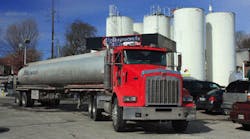FUEL hauling and retailing make a good combination at Hollingsworth Oil Company. Both activities have brought steady growth for the Springfield, Tennessee petroleum marketer.
Hollingsworth Oil's 26-truck fleet hauls about 170 million gallons of refined fuels each year. Much of that goes to the company's 46 c-stores in Tennessee and Kentucky. The fleet also serves a growing number of retail customers.
“You have to get bigger to be successful in petroleum retailing,” says Ronnie Hollingsworth, president of Hollingsworth Oil. “For instance, our current goal is to grow our c-store operation to 50 stores. It is critical in today's economic climate that we must have volume, plus diversification, to remain competitive.
“To gain the volume, we've grown internally and through acquisition. Over the years, we bought 14 other petroleum marketers in our operating area. In addition to petroleum transport, we expanded into other trucking operations, including rock and sand hauling. We continue to look for new opportunities.”
Diversified company
The diversified nature of the company paid off over the past year. “After our best year ever in 2008, we saw a significant drop in retail fuel sales in 2009,” Hollingsworth says. “Our transport operation continued to do very well through 2009, and we were very pleased with the rate of return from transport.”
Hollingsworth grew up in petroleum marketing, and it is in his blood. His grandfather operated a service station called Sudden Service, a name that lives on in the company's c-stores. In a few short years, Hollingsworth's grandfather was able to establish a petroleum dealership, Orman Oil Co, and he remained active in the business until his death in 1961. Hollingsworth's father and uncle continued the business.
Hollingsworth pursued his own petroleum marketer opportunities after graduating from college in the early 1970s. By 1974, he had purchased half of an Amoco jobbership, and he bought the rest of it a year later.
Farming was a strong market for Hollingsworth Oil from the very start, and is still important today. The petroleum marketer also serves truck fleets and municipal and state government entities. C-stores dominate the business, though. Hollingsworth Oil handles deliveries to 250 c-stores in addition to its own group of 46.
Fuel lineup
The petroleum marketer and transporter provides its customers with a full range of fuel products — gasoline, diesel, kerosene, and ethanol. “We sold a lot of kerosene this past winter, because it was unusually cold,” Hollingsworth says. “We believe our ethanol volume will continue to grow due to EPA (Environmental Protection Agency) mandates. EPA is mandating 12 billion gallons of ethanol in 2010 for blending with gasoline, and mandatory increases will continue through 2020.”
Most of the fuels marketed and distributed by Hollingsworth Oil come out of petroleum terminals in Nashville, Tennessee. However, ethanol shipments handled by Hollingsworth Oil are transported to the Nashville loading racks from a plant in Hawkinsville, Tennessee.
A majority of the refined fuel shipments go directly to customers, but Hollingsworth Oil handles some product distribution through its bulk plants in Springfield and Clarksville, Tennessee. The Springfield bulk plant has 250,000 gallons total capacity, and ethanol storage accounts for about a third of that. The Clarksville facility has 120,000 gallons capacity.
Operating out of those bulk plants are more than 30 drivers who are assigned to Hollingsworth Oil's tank trucks and petroleum transports, which run under the Lynn Transport name. “Most of our transports each handle three to four loads a day on a single shift,” says Johnny Stewart, Hollingsworth transportation director. “However, we do have four night drivers, who give us the ability to maximize productivity on some of our transports.”
Driver team
Hollingsworth Oil has built a strong core group of drivers, and the company was able to add some very good drivers over the past year. Typically, the company tries to hire drivers with at least two to three years truck driving experience, but it has trained new hires from scratch in the past.
Experienced new hires go through a training process that lasts up to six weeks. Training starts with an orientation that covers company policies, Department of Transportation regulations, defensive driving, and hazardous materials handling. Drivers also undergo instruction at each supplier's loading rack, and they spend several weeks working on the road with a driver/instructor.
Drivers receive detailed hands-on training on the vehicles in the Hollingsworth Oil fleet. The company runs four tankwagons, 21 tractors, and 22 tank trailers. Kenworth supplied all of the tractors in the fleet and most of the trucks used in the tankwagon applications.
“We started buying Kenworth trucks in the 1990s, because they build a very good product, and we get excellent service from our dealer,” Hollingsworth says. “We also benefit from our Kenworth relationship as a cbuying member, because we get rebates for every Kenworth truck we buy.
“We joined the cbuying program in 2007 just before we placed the biggest truck order (33 tractors) in our company's history. Those tractors were for other trucking divisions in addition to Hollingsworth Oil. At the time, we wanted to get ahead of the initial EPA regulations that mandated exhaust gas recirculation.”
A majority of the tractors in the fleet are T800 conventionals. For tankwagons, the petroleum marketer specifies T330s with 2,800-gallon cargo tanks and T450s with 4,200-gallon tanks. Tractors typically are replaced at five years, but the tankwagon trucks have a much longer lifecycle.
Tractors currently are specified Cummins engines, but the company is giving serious consideration to the new Paccar engines for future vehicle purchases. Tractors also have 10-speed Eaton Fuller transmissions. Other equipment includes Roper product pumps, Kelley tires, and Alcoa aluminum disk wheels.
Tank trailers
Heil is the petroleum trailer builder of choice for Hollingsworth Oil. “Their trailers work well for us, and they are built in Tennessee,” Hollingsworth says. “Heil has been in business a long time, and they know how to build a petroleum trailer for a long life. We still have the first new Heil trailer that we bought in 1978. There is no telling how many million gallons of fuel we've put through that trailer.”
The company buys DOT406 trailers with a 9,200-gallon capacity. Hollingsworth Oil runs four- and five-compartment trailers. Many of the trailers have spring suspensions, but the company will specify air suspensions with future orders.
Truck-mounted cargo tanks typically have four compartments, and most were built by Young's Tank Inc. Product handling hardware is fully enclosed in a curbside cabinet.
To keep vehicles operating reliably and on schedule, the company has a five-bay shop in Springfield for preventive maintenance and repairs. Tankwagon chassis changeouts are handled in-house by the maintenance team, which includes four mechanics.
Other maintenance facilities at the Springfield location deal with convenience store equipment service, including pump service and overhauls. Hollingsworth Oil has EPA certification to leak-test underground storage tanks at c-stores and other sites.
Diversification gives Hollingsworth Oil a broad range of services that enabled the company to weather one of the worst US recessions. The management team believes the company is well-positioned to continue steady growth as the economy recovers. ♦

















